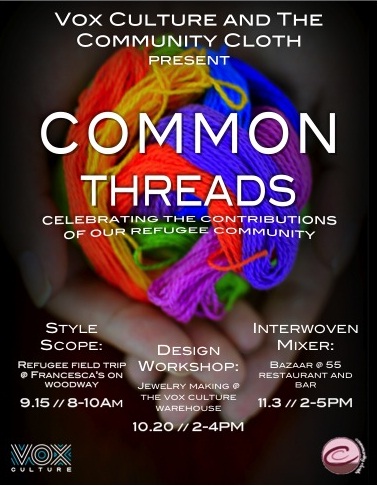As Vox Culture begins its trimester on “Refugees at Home”, it is important to note how interconnected our world can be, specifically in terms of the social issues that occur around us every day. We believe that symptoms from one social issue can be closely linked to another and our goal is to help our audience grasp a better understanding of these connections. September is Houston’s Human Trafficking Awareness Month. Appropriately, the goal of this post is to describe how Vox’s current focus on the issue of refugees is connected to human trafficking.
The below points were drawn from a 2007 United Nations High Commission for Refugees Report, written by Kaori Saito, that addresses the new issues in refugee research.
(1) Victims of human trafficking can be refugees.
While some trafficked victims are able to go back to their native homeland after having gone through their ordeal, some may be unable to return for fear of further reprisals by traffickers, without much state protection. These victims would fall within the definition of a refugee according to Article 1A(2) of the 1951 Convention relating to the Status of Refugees.
Trafficked persons and those who fear being trafficked can be defined as refugees under the 1951 Convention if they meet all the elements defined in Article 1(A). These individuals would also be entitled to international refugee protection as long as there is a well-founded fear of persecution based on one of the Convention grounds and their homeland cannot (or refuses to) provide protection against further re-trafficking or reprisals by traffickers. Saito further states that, “there is no reason why a victim of trafficking who fears returning home due to the real possibility of being re-trafficked, targeted for reprisals, or threatened with death, should not be granted refugee status where the state of origin is unable or unwilling to protect that person against such harm.”
(2) Refugees can also become victims of human trafficking.
Refugees and internally displaced individuals fleeing from persecution are also targets for traffickers. Due to having been displaced and other related vulnerabilities, refugees and internally displaced individuals are put at a greater risk of exploitation and abuse. Saito further adds that, “to access countries of asylum in an environment of tightening visa regimes and border controls, some refugees may resort to desperate and even illegal measures in their search for a safe country and of livelihoods and can fall prey to trafficking.”
If Saito’s argument in this report is to be summarized, the connection between human trafficking and refugees is seen as coalescing around the term persecution. In order to learn more about the overall discussion, I highly encourage you to read this UNHCR report… you will be amazed as to how the causes that Vox Culture focuses on are truly interconnected.
http://www.unhcr.org/research/RESEARCH/476652742.pdf
 Friday, September 21, 2012 at 11:36AM
Friday, September 21, 2012 at 11:36AM 









